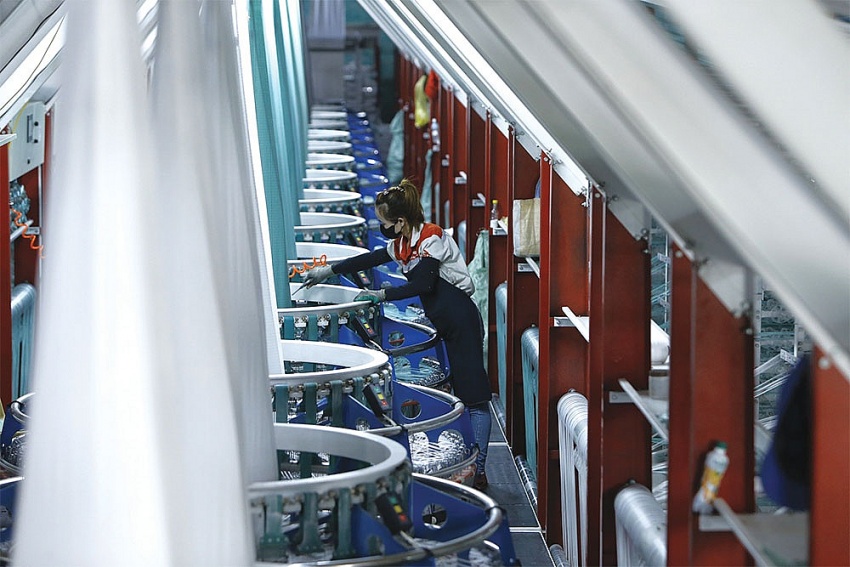More actions in need for EU bonanzas
The European Chamber of Commerce in Vietnam (EuroCham) will launch its annual whitebook on January 16, providing a comprehensive set of recommendations under the theme of boosting investment in Vietnam towards a green and sustainable economy.
 |
| It is hoped with more procedures smoothing that EU investment into Vietnam across a multitude of sectors will begin to blossom, Photo: Duc Thanh |
While having strong attention in Vietnam, European investment in Vietnam yet to meet expectations. According to statistics from the Ministry of Planning and Investment, about $2 billion was the total investment of EU member countries in Vietnam in 2023, compared to more than $2.45 billion in 2022.
Administrative and bureaucratic inefficiencies persist as the primary obstacles, despite various pieces of legislation being put into effect over the past five years on improving business environment reform and enhancing competitiveness.
Nevertheless, major ventures continue to be realised or put into motion in Vietnam, led by European groups.
John Cockerill from Belgium is finalising procedures to invest in a high-tech project for the energy industry in the Saigon High-tech Park (SHTP) in Ho Chi Minh City. The company has strengths in manufacturing machinery and industrial solutions in energy, environment, hydrogen, and industrial services.
High-tech and green investment have been among the investment trends among European companies in Vietnam in recent years. In November, BE Semiconductor Industries from the Netherlands was licensed to inject nearly $5 million in the first phase of manufacturing semiconductor equipment components at the SHTP.
In general, the global economic pace has been slow since 2019 due to the pandemic and geopolitical uncertainty. Diversification of supply chains has been a priority for the West and Vietnam is a destination that offers many advantages in the region.
Key sectors for investments continue to be renewable energy, seaports, semiconductors, vehicles, electronics, footwear, textiles, coffee, pharmaceuticals, and food processing.
According to EuroCham, which represents the voice of more than 1,000 businesses, Vietnam’s growing middle class has led to a significant increase in consumer spending. It can expect this trend to continue for decades to come.
European investors are making the most of this trend by investing in food and beverages, retail, fashion, and services, for example. With Vietnam’s skilled workforce and competitive production costs, European investors are also attracted to high-tech manufacturing sectors such as electronics, precision engineering, and advanced materials.
This interest continues to be shown in the Business Confidence Index (BCI) for Q4 of 2023, released early this week. A notable number of businesses express positive sentiment about their performance (increasing from 24 to 32 per cent), and anticipate maintaining this elevated level into the first quarter of 2024 (29 per cent).
The BCI states that while Vietnam’s macroeconomy may not have maintained the robust performance observed in 2022, the country is still seen as an attractive investment destination, with more than 60 per cent of businesses considering it within their top 10 destinations. Additionally, a larger number of businesses anticipated a more substantial increase in their company’s foreign direct investment in Vietnam compared to last year.
Le Net, lawyer at LNT & Partners, admitted that several factors can affect the realisation of expected investment outcomes.
“The most important factor is unpredictable and unstable regulatory issues. The second factor is the environment. Vietnam is notorious for the polluted environment, albeit being a beautiful country, and traffic jams, caused partly by mindsets that can impact investor confidence,” Net said.
“To enhance the attractiveness of the investment environment and encourage more EU investments, Vietnam could consider regulatory reforms, infrastructure development, transparency in rule of law, and more investor protections.”
According to Vaibhav Saxena, lawyer at VILAF, the EU and Vietnam are yet to realise their full potential for bilateral investment and trade.
“This year is expected to revive the economic situation worldwide and we foresee sizable investments flowing from EU member countries into Vietnam,” Saxena said.
Vietnam has already provided a 2 per cent VAT cut until June and is further considering supportive policies to cope up with the global minimum tax regime, he added.
“There seems to be two key areas for consideration: easing admin procedures to support doing business, and encouraging international financing standards with a domestic banking industry blend,” Saxena added.
| Julien Guerrier Ambassador of the European Union to Vietnam Given the uncertain global outlook for 2024 and evolving social and economic challenges, Vietnam has an opportunity to develop a modern regulatory environment to consolidate the country’s ambition to transform itself into a 21st-century Asian Tiger. Throughout the years, Vietnam has been an important partner of the EU when it comes to economic issues, digital transformation and the green transition, in addition to regional security and stability. However challenging the future may be, the EU is and will remain one of Vietnam’s closest partners. In order to boost trade and economic growth, openness and transparency should be continuously improved, and public administration should be modernised. The EU-Vietnam Free Trade Agreement is playing a crucial role in this process and is contributing to Vietnam’s success in overcoming economic challenges arising from supply chain disruptions, rising fuel prices, and food insecurity. The deal has facilitated Vietnam’s consolidation of its development trajectory by aligning Vietnamese regulations with international standards. This has improved regulatory compatibility and reduced regulatory obstacles, creating a more favourable environment for Vietnam’s growth. Through this economic progress, Vietnam will have the opportunity to further bolster its economic capacity and advance its social and labour rights. Vietnam will continue to strengthen its position as a key hub for the EU’s partnership strategy, actively engaging in initiatives such as the EU Green Deal, Global Gateway, and the EU-Vietnam Framework Participation Agreement. To achieve this, it will be essential to engage in in-depth discussions and exchange practical insights on the business and policy environment between the EU and Vietnam. Gabor Fluit Chairman European Chamber of Commerce in Vietnam The EU-Vietnam Trade Agreement, which celebrated its third year in August 2023, has been especially important. The results speak for themselves. In 2019, before the deal took effect, total trade volume between the EU and Vietnam stood at $57.81 billion. By the end of 2022, just two years after implementation, this figure jumped to $66.78 billion – a 15 per cent increase. Investors from European companies are also more confident about doing business in Vietnam now. According to the BCI, nearly a third of EuroCham members now rank Vietnam among their top three global investment destinations. This is clearly a vote of confidence in the Vietnamese economy. While celebrating the impressive progress achieved, we as an organisation have a very firm belief in Vietnam’s continued potential. And as a trusted, longstanding partner along this journey, Team Europe remains as committed as ever to supporting Vietnam’s transformation towards a sustainable, innovation-driven future. With this goal in mind, this whitebook provides a comprehensive set of recommendations. Even though environmental sustainability is a main goal, the whitebook takes a broader by focusing on four key areas: business environment improvement, consumer choice discussion, health and beauty industry advancement, and sharing best practices for green and sustainable development. Through these pillars, businesses can enhance their capabilities, revamp their operations, and strengthen their social responsibility. For over two decades, EuroCham has facilitated constructive public-private sector dialogues in Vietnam. By continuing this proud legacy of engagement through this whitebook, we aim to encourage even more meaningful collaboration among stakeholders. Thibaut Giroux Chairman French Chamber of Commerce and Industry in Vietnam Amidst ongoing global uncertainties, the current business landscape in Vietnam continues to hold promise. The country’s economic progress is driven by a commitment to substantial reforms, fostering a significant increase in both the quality and quantity of foreign direct investment. Given this context, 2024 provides a particularly favourable opportunity for undertaking business ventures within Vietnam. The positive trajectory is reinforced by strong advantages and Vietnam’s proactive stance towards necessary transitions for sustainability. The French Chamber of Commerce and Industry in Vietnam plays a pivotal role in fostering this expansion: we are steadfast in our support for European, French, and Vietnamese enterprises, facilitating the cultivation of robust business relationships. As the sole and official representative in Vietnam for the Enterprise Europe Network, the European’s most extensive support network for small- and medium-sized enterprises with international aspirations, and with a widespread network comprising 125 French chambers in 95 countries, we serve as a gateway to global multilateral cooperation. With a dedicated team and a multidisciplinary network, we are committed to providing operational support to companies while expediting their business development efforts. This collaborative approach underscores our commitment to mutual success within the European-Vietnamese business landscape, with a specific focus on promoting French expertise in the green economy as an integral component of our collective achievements. |
 | Vietnam wood industry in the context of EU rules The EU aims to tackle degradation and deforestation along the supply chain and import-export value chain on a global scale. VIR’s Hai Van spoke with Hoang Thanh, programme manager at the EU Delegation to Vietnam about the aspects this country must be wary of. |
 | European business confidence gains traction in Vietnam Confidence among European businesses operating in Vietnam is showing signs of resilience as the latest Business Confidence Index (BCI) from the European Chamber of Commerce in Vietnam (EuroCham) reached 46.3 points in the fourth quarter of 2023. |
 | EU examines Microsoft investment in OpenAI The EU, racing to regulate the fast-moving world of artificial intelligence, said Tuesday it has started a preliminary study of Microsoft's multi-billion-dollar investment in ChatGPT developer OpenAI to see if it could be a disguised merger. |
What the stars mean:
★ Poor ★ ★ Promising ★★★ Good ★★★★ Very good ★★★★★ Exceptional
 Tag:
Tag:
Related Contents
Latest News
More News
- Vietnam, New Zealand seek level-up in ties (February 19, 2026 | 18:06)
- Untapped potential in relations with Indonesia (February 19, 2026 | 17:56)
- German strengths match Vietnamese aspirations (February 19, 2026 | 17:40)
- Kim Long Motor and AOJ Suzhou enter strategic partnership (February 16, 2026 | 13:27)
- Haiphong welcomes long-term Euro investment (February 16, 2026 | 11:31)
- VIFC in Ho Chi Minh City officially launches (February 12, 2026 | 09:00)
- Norfund invests $4 million in Vietnam plastics recycling (February 11, 2026 | 11:51)
- Marico buys 75 per cent of Vietnam skincare startup Skinetiq (February 10, 2026 | 14:44)
- SCIC general director meets with Oman Investment Authority (February 10, 2026 | 14:14)
- G42 and Vietnamese consortium to build national AI infrastructure (February 09, 2026 | 17:32)

















 Mobile Version
Mobile Version